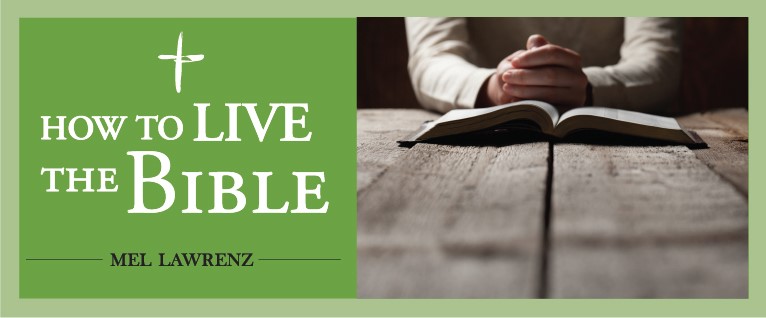
This is the one-hundred-twenty-ninth lesson in author and pastor Mel Lawrenz’ How to Live the Bible series. If you know someone or a group who would like to follow along on this journey through Scripture, they can get more info and sign up to receive these essays via email here.
An older man walks haltingly through the cemetery at Normandy on the north coast of France. He passes through the sea of clean white crosses and stars of David marking the resting places of hundreds of young men whose lives were cut off on D-Day; they died decades earlier so that multitudes could go on living in peaceable societies as parents and teachers and engineers and neighbors. He drops to his knees in front of the marker of someone who saved his life, is thrust into a moment of self-examination, and struggles to get out a plea to his wife who is standing at his side:
“Tell me I’ve lived a good life…. Tell me I’m a good man.”

This scene from a popular film about World War II places goodness as the final tally, the supreme measure, of a person’s life. The man wants to know: did his commander and all the others who paid the ultimate price make a difference—a difference of character—in the lives of others? If the recipients of such great grace did not see life differently, did not live life differently, then what was it all for?
“Tell me I’ve lived a good life.”
What does it take for our lives to be “good”? We know it is not about self-reform. It is not that some people are wired to be good and others bad. As hard as we may try, we cannot make ourselves holy. Scripture tells us that we all are creations of God, made to be good, but born into a world that is twisted and corrupted. We’re born into a sinful race, and so we are sinners from the day we’re born. This is why the sacrifice of Christ whereby we are justified gives us hope. Christ did for us what we cannot do for ourselves. And God’s ongoing work of sanctification—purifying—is what moves us toward goodness.
The purification process begins, and it never ends as long as we live on earth. Nobody will ever rightly hold their “holiness” over you, because all of us are enrolled in the same program. In fact, it’s when people start to flaunt their personal holiness that you start to worry about them getting putrefied rather than purified. Even the great apostle Paul, summarizing his life, said, “Not that I have already obtained all this, or have already been made perfect, but I press on to take hold of that for which Christ Jesus took hold of me” (Philippians 3:12; italics mine)
Holiness is a past, present, and future reality. “You were washed, you were sanctified, you were justified in the name of the Lord Jesus Christ and by the Spirit of our God” (1 Corinthians 6:11).
It’s possible for someone to say that God has enabled him or her to live a good life. And so, with the apostle Paul, we long for this…
“May God himself, the God of peace, sanctify you through and through. May your whole spirit, soul and body be kept blameless at the coming of our Lord Jesus Christ. The one who calls you is faithful, and he will do it” (1 Thessalonians 5:23-24).
PRAY THIS
Dear God, purify me inside and out. Cleanse me and I will be clean. Cleanse my mind. Purify my heart. Suppress my motives that are self-centered and small. Help me believe what you mean when you call us saints.
[See previous – What Is Holiness?]
___________
___________
[If you believe this series will be helpful, this is the perfect time to forward this to a friend, a group, or a congregation, and tell them they too may sign up for the weekly emails here]
Mel Lawrenz (@MelLawrenz) trains an international network of Christian leaders, ministry pioneers, and thought-leaders. He served as senior pastor of Elmbrook Church in Brookfield, Wisconsin, for ten years and now serves as Elmbrook’s teaching pastor. He has a PhD in the history of Christian thought and is on the adjunct faculty of Trinity International University. Mel’s many books include Spiritual Leadership Today: Having Deep Influence in Every Walk of Life (Zondervan, 2016). See more of Mel’s writing at WordWay.
The post How to Live the Bible — What Does It Take to Live a “Good” Life? appeared first on Bible Gateway Blog.










